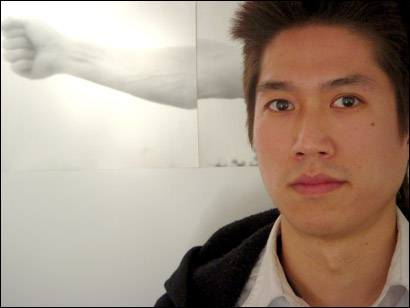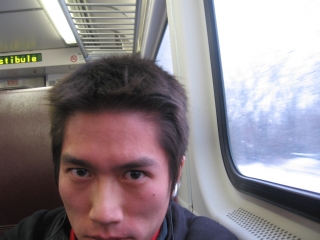Not sure if yall have seen this already. New music video for gidgetsparks’ “climbing this shit.” Video/production is by Tao Lin.
review of “cognitive-behavioral therapy”
2 05 2010Was feeling lonely/bored yesterday, went to Quimby’s and bought Tao Lin’s 2nd book of poetry, cognitive-behavioral therapy. Read it in one sitting at Filter Cafe. It made me think and it made me feel and it made me laugh. I think it is a brilliant, cohesive, very moving book. It seems to have 2 consistent themes/preoccupations: the poet’s personal philosophy of life, and the emotions of a relationship (perhaps one that is ending). There are many reoccurring words, characters, and phrases, but 1 crucial one is the concept/word “distance(s).” This refers to the distance between people, between a poet and her words, the length/expansion of time and space, and [other things]. “Distance” is also crucial to the titular process, cognitive-behavioral therapy, in that it takes time to replace an irrational or negative thought process with a more positive way of thinking and acting (and Lin seems to be accepting of this requirement of time, of distance; furthermore, he seems to, by implication, recommend this process of change). I could ramble on about Lin’s philosophy, about how it makes me feel less alone and hopeful, and about how the book is playful and post-modern and honest and at times astonishingly rapid/fluid in its (poetic) logic, but instead I will direct you to the first poem in the book, “i will learn how to love a person and then i will teach you and then we will know”; I think this poem sums up the book, and gestures at our existential predicament, the passage of time, the need to learn and to try harder, the desire to love another person. Here is the poem.
I highly recommend this book. It is beautiful.
Here are some of my favorite lines from the book:
“the secret of life is that i miss you, and this describes life”
“Bruce Lee is a rare species of hard-muscled hamster capable of insane destruction.”
“the distances i have described in my poems/will expand to find me/but they will never find me”
“do nice things for people/and tell people ‘i love you'”
“to distill the essence of any argument or rhetorical situation/pretend you are speaking from an enormous distance/and the audience doesn’t exist/and you are not the person who is speaking”
“the brain observes nothing from no distance/therefore everything is going to be OK”
“my favorite emotions include ‘brief calmness in good weather’ and ‘i am the only person alive’/without constant reassurance i feel terribly lonely and insane”
“if i could just get you to cry tears of joy one more time”
Comments : 3 Comments »
Categories : Tao Lin
Jaimie on Tao
16 03 2010
Photograph of Tao by Noah Kalina

So Jaimie Eubanks, who blogs here, has written a story “about” Tao Lin and her imaginary love affair with him. I find it cute, strange, and amusing in a hard-for-me-to-describe way. You can read it here in the Journal of Truth and Consequence. I also appreciate Jaimie’s story, “The Sisterhood of the Traveling Pants 2,” which you can read here at Diminished Capacity. I like Jaimie’s sensibility, how amusing and unpredictable she is, how strongly her personality comes across, and the shifts in her stories.
Comments : Leave a Comment »
Categories : Jaimie Eubanks, Literature, Other People's Writing, Tao Lin
I like Tao Lin
5 03 2010Here is an older story of his called “Christmas.” Reminds me of that Rimbaud line, “When will we go, over mountains and shores, to hail the birth of new labor, new wisdom, the flight of tyrants and demons, the end of superstition, – to be the first to adore! – Christmas on earth!”
Comments : Leave a Comment »
Categories : Literature, Other People's Writing, Tao Lin
The Final Emotions
25 02 2010Was just reading through old entries on Tao Lin’s website, and this entry, in which he examines the work of Lorrie Moore, is very illuminating. He admires Lorrie, but wonders aloud why her story about a mother’s child having cancer, “People Like That Are the Only People Here,” is praised over her other stories. He makes (to me) a very important point when he concludes the following:
people generally like it (deem it acceptable and ‘important’) when problems are concrete, like cancer or immigration, but do not like it (call it self-indulgent, unimportant, and selfish) when problems are complex, like feeling sad or strange or doomed for no easily explainable reason
but why do people feel depressed?
not because of one single thing like cancer or immigration and not because of being self-indulgent or weak-minded, but because of the cumulative effect of the following, all of which are real things
that we will all die one day, that time moves in one direction and we only get one chance to get things right, that we are conscious things and so are conscious that other people are thinking things that we will never truly understand, that we do not choose to be born and that that first event of birth is the cause to every effect of our lives, so that we probably do not have free-will, that in a world of electrons and protons and neutrons, each particle the same, we are required to arbitrarily differientiate, that… about a million more things
which is more universal, less simplified and maybe ‘more important,’ (i’m writing now from the point-of-view of people who go around saying that ‘stories matter’ and that ‘tea-towel’ fiction, stories where ‘nothing happens,’ is not as ‘important’ as ‘immigration’ stories or ‘political’ stories) than for example cancer stories or stories about being confused of your identity, if you are ‘hispanic’ or ‘white’ or ‘asian’ or ‘asian-american’
so one argument could say that writing about feeling depressed, about ‘nothing,’ is writing about life itself while writing about cancer (or race-issues or whatever) is writing about the distraction that is sitting there, in front of life itself, distracting people, people like editors of literary magazines, people like award-givers, who forget about that list of things i listed above
because after cancer and after you resolve your cultural identity issues then there are still the other problems i listed above
(though maybe writing about cancer is being more specific, picking one thing to use to talk about it all, yes i am aware of this argument, i’m just thinking things through in this post, not saying that i’m right, not even making a point either, but probably just defending ‘tea-towel’ fiction)
Now, I actually think people like that particular story of Lorrie Moore’s for more reasons than the cancer aspects. I for one HATE stories about cancer set in hospitals, and yet when I read that story in my college writing workshop, after having read several of Lorrie Moore’s sassy early stories, I finally understood why she was supposed to be significant. And it wasn’t the subject matter, the seriousness of the story that did it. It was her passion. In fact, what really sold me is the ending when, after a long, exhausting emotional journey, she ostensibly slams her writer fist down on the desk, and sort of gestures at the autobiographical nature of the story when she writes something like, “Those are the facts. Now where’s the money!” There’s this rupture of the ordinary world of the short story where events are held at a distance and described calmly and plainly.
Nonetheless, if only more of the book world agreed with Tao that there’s nothing wrong with examining the imaginative truth of emotions-as-they-are, detached from politics and identity, because these emotions—loneliness, fear, longing—are the deepest, the final emotions. No one can escape them.
Comments : Leave a Comment »
Categories : Literature, Other People's Writing, Tao Lin
Tao Lin
25 02 2010I finally read Tao Lin’s novella, Shoplifting from American Apparel. I liked it. I think he conveys the emotions of his characters (which are relatable to many people) without stating what those emotions are. The main character, Sam, and the various girls with which he is involved during the book feel very real and true-to-life despite the deadpan, declarative-sentence style in which they are rendered. Indeed, the characters’ lives are concrete, composed of individual, specific events that Tao presents but does not linguistically judge or distort. As he says in his radio interview with Michael Silverblatt on Bookworm, Tao’s writing style in this novella is an enactment of Buddhism. There is an attempt to move toward pre-language. One may also say that Tao gives dignity to the ways many young people attempt to relate with one another. His work takes in the full spectrum of human emotion, from enthusiasm to absurdity to despair to self-laceration to love to detachment. Not to mention he’s frequently funny. On a less-loving, but satisfying note, here’s an essay Tao wrote awhile back for 3:AM Magazine in which he “severely trashes” Granta Magazine’s publication, Best of Young American Novelists 2. If you’re interested in Tao, he is all over the internet. This interview with BOMB is helpful in terms of Tao explaining what he thinks he does.
Bonus:
Tao Lin reading some hilarious/sad poems (or being obnoxious, depending on your taste in things).
Unrelated Bonus:
Lil Wayne’s Twitter until he goes to jail (this is actually real, apparently)
Comments : Leave a Comment »
Categories : Literature, Other People's Writing, Tao Lin
Tao Lin
7 10 2009
Get to know Tao Lin, author most recently of Shoplifting from American Apparel, through this wonderful interview he did with the Rumpus. He is an intriguing figure, in that he has cultivated a rabidly self-promoting online persona and in many interviews seems to dares you to write him off as vapid and nihilistic, but seems to be, in reality, a hard-working, earnest, shy writer with very interesting ideas. Not to mention this vapid nihilist has for literary influences the decidedly human and moral writers Lorrie Moore and Joy Williams, amongst others. The interview linked to above best shows his “serious” side, as he would scare-quote it. For a taste of his “comedic” side, or “snarky” side, check out The Levels of Greatness a Fiction Writer Can Achieve in America. Also see his blog here.
Comments : Leave a Comment »
Categories : Other People's Writing, Tao Lin



